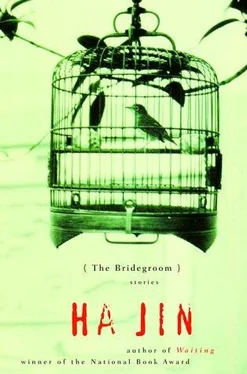“Stand still, all of you,” said Wan. A policewoman waved a black wand over Baisha, a gadget like a miniature badminton racket without strings.
“Is this a mine detector or something?” Jinglin asked the policewoman.
“A metal detector,” she said.
“What’s going on here?” Baisha asked Wan.
“Someone threatened to blow this place up.”
We were all horrified by that, hoping it had nothing to do with us.
The police let us in. The moment we entered we saw an old couple standing behind the counter taking care of orders. Damn it, Peter had brought his parents in to work! How come he wasn’t afraid a bomb might blow them to pieces? In a corner, Susanna and two student-looking girls were wiping tables and placing silver. They were humming “We Shall Overcome,” but stopped at the sight of us. In the kitchen the two part-timers were frying chicken. Dumbfounded, we didn’t know how to respond to this scene.
Mr. Shapiro came over. He looked furious, his face almost purple. He said to us, his spit flying about, “You think you can frighten me into obeying you? Let me tell you, you are all terminated!”
I didn’t know what his last word meant, though I was sure it had a negative meaning. Manyou seemed to understand, his lips twitching as if he were about to cry. He gulped and couldn’t say a word.
Peter said to us, “We can’t use you anymore. You’re fired.”
“You can’t do this to us,” Baisha said to Mr. Shapiro and stepped forward. “We are founders of this place.”
Mr. Shapiro laughed. “What are you talking about? How much stock do you have in this company?”
What did he mean? We looked at one another, unable to fathom his meaning. He said, “Go home, don’t come anymore. You’ll receive this month’s pay by the mail.” He turned and walked off to the men’s room, shaking his head and muttering, “I don’t want any terrorists here.”
Peter smiled at us with contempt. “Well, the earth won’t stop spinning without the five of you.”
I felt the room swaying like a lumbering bus. I never thought I could be fired so easily: Mr. Shapiro just said a word and my job was no more. The previous fall I had quit my position in a coal yard in order to work here. Now I was a total loser, and people would laugh at me.
The five of us were terribly distressed. Before we parted company on the street, I asked Manyou to spell for me the word Mr. Shapiro had used. With his fountain pen he wrote on my forearm, “Terminated!” There was no need for an exclamation mark.
At home I looked up the word in my pocket dictionary; it says “finished.” My anger flamed up. That damned capitalist believed he was finished with us, but he was mistaken. We were far from terminated — the struggle was still going on. I would ask my elder brother to cut the restaurant’s electricity first thing the next morning. Baisha said she’d have one of her boyfriends create some problems in Cowboy Chicken’s mail delivery. Manyou would visit his friends at the garbage center and ask them not to pick up trash at the restaurant. Jinglin declared, “I’ll blow up Peter’s Victorian!” Feilan hadn’t decided what to do yet.
This was just the beginning.
Ha Jin left his native China in 1985 to attend Brandeis University. He is the author of two books of poetry; two previous collections of stories, Ocean of Words, which won the PEN/Hemingway Award, and Under the Red Flag, which won the Flannery O’Connor Award for Short Fiction; and two novels, In the Pond and Waiting, which won both the National Book Award and the PEN/Faulkner Award. He lives near Atlanta, where he is Young J. Allen Professor of English and Creative Writing at Emory University.












